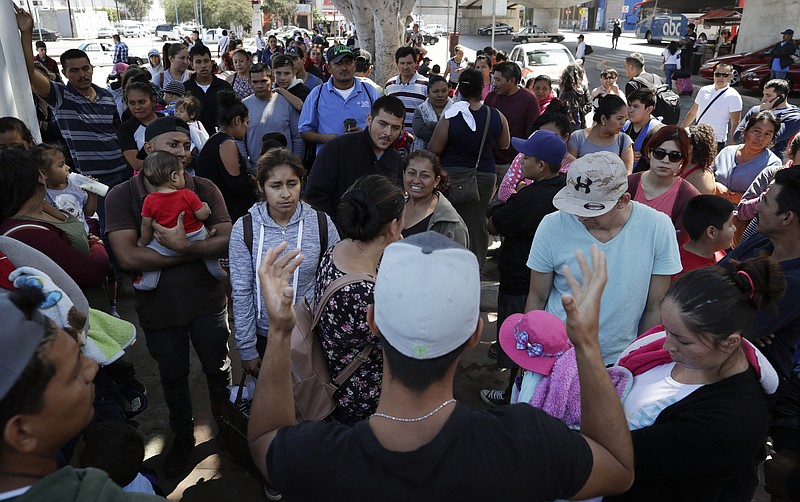TIJUANA, Mexico (AP) — The MS-13 gang made Jose Osmin Aparicio’s life so miserable in his native El Salvador that he had no choice but to flee in the dead of night with his wife and four children, leaving behind all their belongings and paying a smuggler $8,000.
Aparicio is undeterred by a new directive from Attorney General Jeff Sessions declaring gang and domestic violence will generally cease to be grounds for asylum. To him, it’s better to take his chances with the American asylum system and stay in Mexico if his bid is denied.
“Imagine what would happen if I was deported to El Salvador,” he said Wednesday as he waited at the border to enter the U.S.
The directive announced Monday could have far-reaching consequences because of the sheer volume of people like Aparicio fleeing gang violence, which is so pervasive in Central America merely stepping foot in the wrong neighborhood can lead to death.
The Associated Press interviewed several asylum-seekers this past week at a plaza on the border, and each of them cited gang violence as the main factor in fleeing their homelands. They planned to press on with their asylum requests in spite of the new rule.
The decision by Sessions came as the administration faced a growing backlash over immigration policies and practices human-rights advocates view as inhumane, including separating children from immigrant parents. They leveled similar criticism over the asylum changes, which the White House said are necessary to deter illegal immigration.
“The mere fact that a country may have problems effectively policing certain crimes — such as domestic violence or gang violence — or that certain populations are more likely to be victims of crime, cannot itself establish an asylum claim,” the attorney general wrote Monday, overruling a Board of Immigration Appeals decision granting asylum to a Salvadoran woman fleeing her husband.
U.S. officials do not say how many asylum claims are for domestic or gang violence, but advocates for asylum seekers said there could be tens of thousands of such cases in the immigration court backlog alone.
Many Central Americans seeking asylum say they are fleeing from gangs known as “maras,” primarily the Mara Salvatrucha (or MS-13) and Barrio 18 groups. President Donald Trump has condemned those groups and the violence they commit in the U.S., referring to members as “animals.”
The gangs were formed by young Central Americans mostly in Los Angeles decades ago and spread to the so-called Northern Triangle countries of Guatemala, El Salvador and Honduras when members were deported. Today, Honduras and El Salvador in particular routinely post some of the world’s highest homicide rates.
In Central America, maras stake out and battle over turf, attacking anyone who unwittingly crosses through their area on the way to school or work as a possible rival.
Gangsters sometimes forcibly take over people’s homes. They extort bus drivers and small business owners, killing those unable or unwilling to pay. They threaten teens and young men in attempts to recruit them, and force girls and young women to be their girlfriends.
Maureen Meyer, director for Mexico and migrant rights at the Washington Office on Latin America advocacy group, said the ruling would “make it very difficult for a lot of the people seeking asylum in the United States.”
Meyer said Central Americans commonly request asylum for extortion, forced recruitment and violence against women. Where the gangs are prevalent, moving elsewhere is not an option, she said.
“People feel very insecure in their homes and continue to see the U.S. as a safe haven in spite of Trump’s anti-immigrant rhetoric,” Meyer said of the steady northbound flow of Central Americans that began in 2014.
More than 100 asylum seekers gathered Wednesday near the entrance to San Diego, the largest crossing on the U.S.-Mexico border. Some Mexicans in the crowd said they were fleeing criminal groups.

